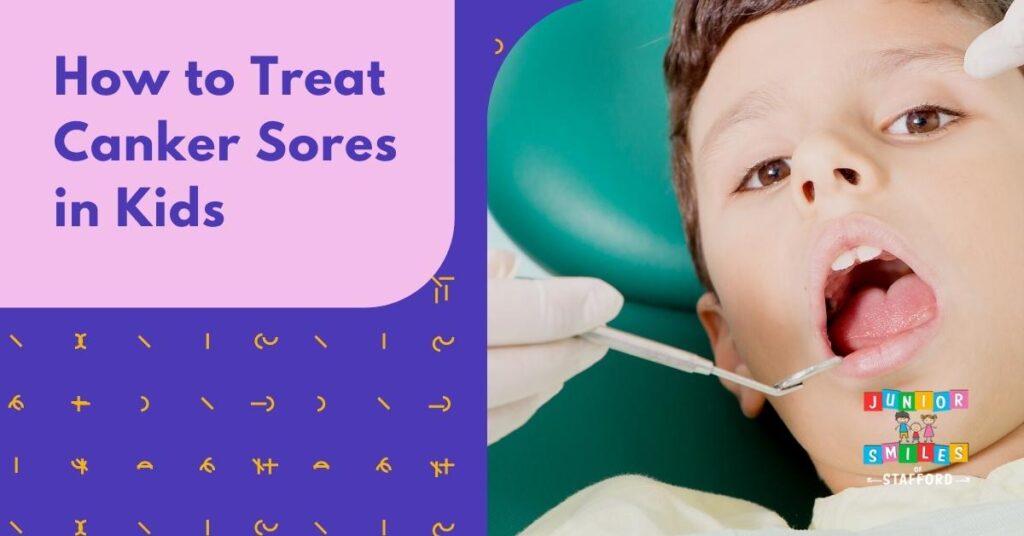Gentle Care: Effective Canker Sore Treatment for Kids

Canker sores are a medical condition. A small percentage of the population experiences canker sores. Although canker sores can affect anybody, they tend to manifest more frequently in females and teens. The same holds true for your youngster. So if your child encounters a canker sore for the first time and you don’t know what to do, this article will guide you through it. Read on to learn more.
Understanding Canker Sores in Kids
Mouth ulcers known as canker sores are not infectious. These are painful mouth sores that are white in color. In the beginning, your child could experience a tingling sensation. After that, a reddish-brown lump or patch will appear. The most common sites for canker sores to manifest are the insides of the mouth, cheeks, and tongue. Because of these sores, your kid may have difficulty with swallowing, talking, and drinking. While it is not uncommon for children to experience a single canker sore, it is more typical to have a cluster of them.
How Do Canker Sores Form?
When oral tissues are injured or stretched, a canker sore can break out. This is something that can occur, for instance, when getting your teeth cleaned or undergoing minor dental work. Biting the tongue or the inside of the cheek might cause your youngster to have a canker sore. Certain diets, stress, and infections are other potential reasons. In most cases, canker sores are circular and around half an inch (or 6 millimeters) in diameter, although they can increase in size.
What Causes Canker Sores in Kids?
Even though the root cause of canker sores is unknown, there are predictable patterns to when they appear: One example is the higher incidence of canker sores in girls compared to boys. While canker sores are more common in adolescents, they can still afflict children younger than 10 years old. Stress, food allergies, oral injuries, infections, viruses, bad nutrition, and heredity are some of the other variables that have been connected to the development of canker sores.
Symptoms and Identification of Canker Sores in Children
There may be some variation in how symptoms manifest in children. The most prevalent signs of canker sores are as follows:
Blisters
Some children may have tiny, red-ringed white spots within their mouths that are just a few millimeters around. They tend to cluster together and are most commonly found on their lips or cheeks.
Difficulty Talking or Eating
Kids may experience significant discomfort from canker sores. They may have trouble eating or speaking normally due to a tingling feeling within their mouth. When they touch or brush against the region, they may also experience physical discomfort.
No Fever
In most cases, canker sores do not cause a fever. A severe case of canker sores, though, can cause other symptoms such as fever, enlarged lymph nodes, and puffy face.
Canker Sore Treatment Options for Kids
It usually takes a few days for canker sores to heal without any treatment. Still, there are a number of ways to lessen the discomfort and frequency of canker sores.
OTC Medicine
Administer over-the-counter (OTC) pain relievers and fever reducers to your kid, including ibuprofen or acetaminophen. However, avoid giving ibuprofen to children less than six months old. And remember that it’s always best to consult with your child’s doctor before giving aspirin to anybody under the age of 19. Remember that aspirin might increase your child’s risk of Reye syndrome. Although uncommon, this condition is exceedingly dangerous. Its usual targets include the central nervous system and the liver.
Topical Medications
You can alleviate discomfort by applying medication directly to the area. Many different kinds of topicals, including sprays, gels, and creams, are on the market. After carefully wiping the area with a tissue to remove excess moisture, use a cotton swab to administer the medication directly to the canker sore. For 30 minutes following application, refrain from consuming any food or liquids.
Mouthwash
Every day, ask your child to rinse their mouth many times with a combination of one cup of water and half a teaspoon of salt. Make sure your little one doesn’t gulp down the salt water mixture. Additional measures to lessen inflammation and stop the spread of infection around the wound include the use of products with triclosan and chlorhexidine.
Home Remedies for Canker Sores in Toddlers
Most of the time, home treatments can alleviate canker sores in children, especially since the lesions usually go away within two weeks without any further treatment. An example of a home cure would be to provide enough fluids. It is crucial to keep your child hydrated as they recuperate. To reduce the risk of infection, it is recommended that you brush and floss your children’s teeth at least twice a day and that you switch to a milder, less strong toothpaste for them. Furthermore, it is important to make sure the youngster stays away from rough foods like nuts and seeds and instead consumes only liquids or soft meals until the discomfort from eating goes away. Things that are hard or crunchy could aggravate the sores.
Preventing Canker Sores in Kids
Preventing canker sores in children involves several practical and straightforward tips. Here are some examples you could follow:
Maintain Good Oral Hygiene
Encourage your kid to brush their teeth at least twice a day and floss daily. This helps to remove food particles and bacteria that can contribute to canker sores. It can also help avoid other potential oral health issues from developing.
Prepare a Well-Balanced Diet
Ensure the child’s diet is rich in vitamins, especially B12, iron, and folic acid, which can help prevent sores. Educate them about their benefits as you prepare them, so they will understand its importance.
Stress Reduction
Since stress can be a trigger, teaching children relaxation techniques like deep breathing or meditation can be beneficial. Do it with your child every day for at least 30 mins. It can also serve as your quality time.
Seek Professional Advice
If canker sores are frequent or severe, seek advice from a healthcare professional for potential underlying causes and treatment options. You should also bring your child to their dentist regularly for check ups.
When to Seek Professional Help
See your child’s doctor or pediatric dentist if the canker sore breakouts are really painful, recur frequently, are exceptionally big, or last for longer than a few weeks. Get medical help if you suspect you have a canker sore but aren’t sure if a blister or other lesion is the real deal.
Notifying your child’s pediatric dentist about mouth sores at their next appointment is a recommended idea regardless of how minor the condition may be. Dental checkups and advice on how to alleviate canker sores in children can be obtained from your child’s regular dental visits.
Stop Canker Sores Before It Worsens
Canker sores, while uncomfortable, are a common issue in children and can be managed effectively with the right care. Remember that when it comes to your child, any health issues, whether mild or severe, should be monitored and taken care of immediately.
If you want professional advice and treatment, look no further than Junior Smiles of Stafford. As experts in pediatric dentistry, we are dedicated to providing the highest quality care in a friendly, comfortable environment. Our team understands the unique needs of children and is equipped with the expertise to address a range of dental issues, including canker sores.

